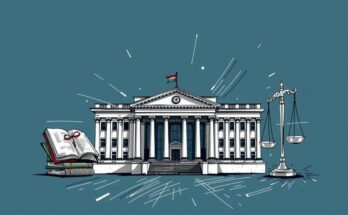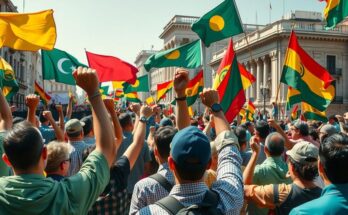The Philippine midterm elections feature over 18,000 positions, including 12 Senate seats key to Sara Duterte’s impeachment. Former President Rodrigo Duterte is running for mayor in Davao amidst ICC charges. Allies for Marcos and Duterte vie for influence amidst emerging political conflicts post their 2022 alliance. Today’s results will significantly impact the political landscape moving forward.
Today marks a pivotal day in the Philippines as millions head to the polls for the midterm elections, comprising over 18,000 positions available for election. Voting commenced at 7:00 AM local time and will wrap up by 7:00 PM. Among the most crucial aspects of this election are the twelve Senate seats contested, which can significantly influence Vice President Sara Duterte’s impending impeachment proceedings.
On the ballot is former President Rodrigo Duterte, 80, seeking the mayoral position in Davao City, his home turf. Amidst awaiting trial at the International Criminal Court in The Hague, Duterte must navigate the complexities of his controversial political legacy. Davao City has been under his family’s political control for decades, a streak that may continue if he secures victory.
The slate for the senatorial candidates backing former President Duterte is fairly noteworthy. Among them are his loyal aide Bong Go and ex-police chief Ronald dela Rosa, both prominent figures in the controversial “war on drugs”, presumed responsible for numerous killings under Duterte’s administration. Their group, dubbed DuterTen, comprises various loyalists, including fugitive pastor Apollo Quiboloy, a pop singer, and other supporters, primarily from the PDP-Laban party.
On the flip side, Bongbong Marcos, the currentPresident, is rallying a diverse lineup of individuals for his senatorial roster, featuring former movie stars, boxing legend Manny Pacquiao, seasoned senators, and entrenched political dynasties. Marcos’ coalition, called the Alliance for the New Philippines, is well-comprised of influential families and affluent supporters, with candidates like Camille Villar stepping in to succeed her mother.
The Marcos-Duterte coalition triumphed in the 2022 general elections, marking a remarkable return for the Marcos family after decades. Despite their fruitful partnership, tensions have begun to emerge, fueled by diverging political stances and agendas that now threaten the alliance.
In Davao City, Rodrigo Duterte’s potential political resurgence is igniting curiosity and speculation. Even from a distance, his name still commands respect in the city that has been his stronghold for years. His youngest son, Sebastian, is camouflaging his own ambitions behind his father’s legacy as he vies for the vice-mayoral position.
Today’s election outcomes not only reflect a referendum on Bongbong Marcos’ leadership but may also define the future of the Duterte family in national politics, especially amid challenges posed by potential impeachment. Should Sara Duterte find herself in a precarious position, her aspirations for the presidential seat in 2028 could be adversely impacted.
In summary, across the Philippine archipelago of 7,600 islands, around 68.4 million voters are making significant choices today. These elections symbolize more than just local governance; they encapsulate the ongoing struggle for power and legacy between two of the Philippines’ most prominent families, as their political rivalry continues to unfold.
In conclusion, the Philippine midterm elections present a crucial junction for both the Marcos and Duterte families. With thousands of positions up for grabs and the potential impeachment of Vice President Sara Duterte looming, this election serves as a test of allegiance, political strategies, and the overall sentiment of the Philippine electorate. It’s a barometer of what’s to come in future elections, specifically the anticipated presidential election in 2028.
Original Source: www.bbc.com




